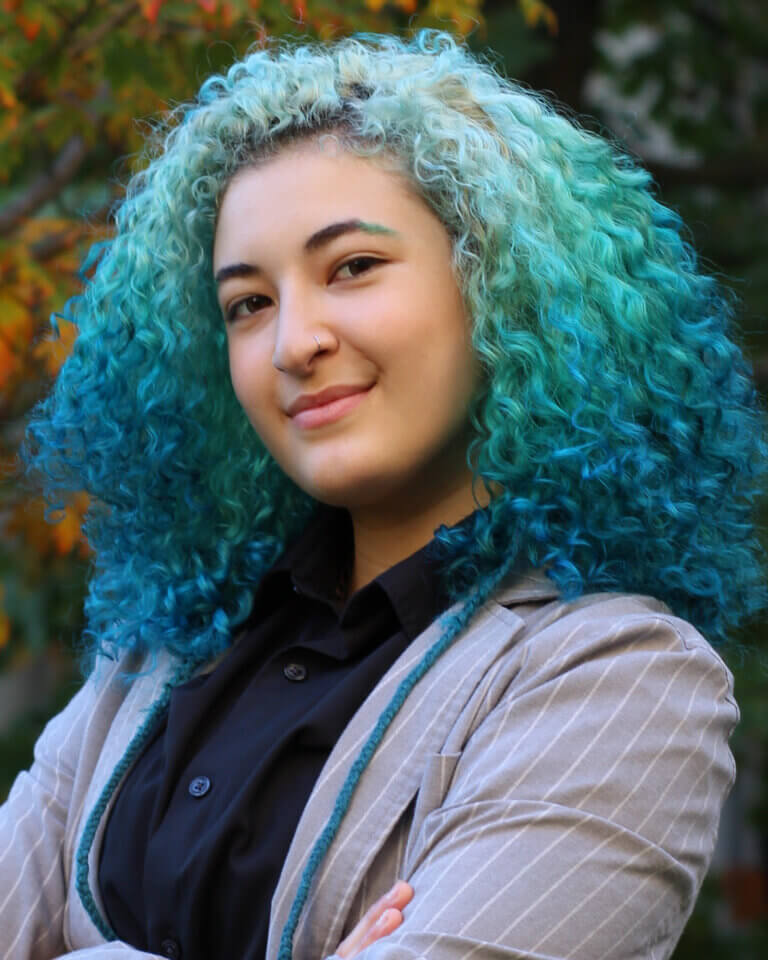Ari Peró
Urban Science and Planning with Computer Science major
Music major

What’ve you enjoyed most about your area of study? Was there a particular discovery, new skill or way of thinking, or insight that you found especially valuable? Please share an example from your favorite class or experience.
Studying music at MIT has been a transformative experience for me. Coming to MIT from a magnet arts high school, I was skeptical about how my musical background would fit into a STEM-focused environment. However, I quickly immersed myself in the Institute’s unique opportunities for exploring diverse musical traditions and techniques, fostering a profound appreciation for the role of music in fostering community and promoting cultural understanding. I’ve had the chance to engage with topics ranging from electronic composition to West African musical tradition, DJ history, and sound design. I went from participating solely in vocal ensembles like Concert Choir, Chamber Chorus, and VJE to learning new ways of music-making in FaMLE and Rambax––experiences I can’t imagine myself having otherwise had the opportunity to experiment with. My favorite experience has been participating in the Emerson/Harris Program for Private Study, where I was able to merge my classical foundation with jazz improvisation techniques. This program not only expanded my vocal technique but also showed me how to approach creative challenges with greater creativity and adaptability.
How does the knowledge from this field, or your interest in it, combine with your other major or minor studies at MIT?
My interest in music has complemented my joint major in Urban Science and Planning with Computer Science by instilling a creative and interdisciplinary mindset in me. My background in music has naturally led to an interest in other artistic disciplines and forms of expression, which I have leveraged to raise awareness about systemic injustices and urban challenges. For instance, I have developed a series of experimental video, sound, and live performance installations exploring my experiences as a trans, Afro-Indigenous activist navigating complex systems of power and oppression. These artistic endeavors shed light on more often overlooked challenges faced by underrepresented communities, such as black transgender women, and demonstrate my commitment to using every tool at my disposal to amplify marginalized voices and effect meaningful change.
Considering my primary major in urban science, background in issue advocacy, and aspirations for a career in nonprofit work, the integration of my artistic pursuits illustrates a holistic approach to social justice. This integration of music with other disciplines has enriched my understanding of how art can be a powerful catalyst for social change, complementing my technical and analytical skills with a creative and empathetic approach to addressing societal issues. By merging artistic expression with technical expertise, I am better equipped to develop innovative solutions that address both the technical and social dimensions of urban challenges, ultimately contributing to more equitable and sustainable urban environments.
An MIT education includes study in the scientific, technical, social science, arts, and humanities fields. How do you think that wide range of knowledge and perspectives will be valuable to you – for your career success and for your enjoyment of life?
In today’s world, artistic endeavors are often viewed as something to be pursued only with the intention of mastering them, so as to “justify” (and be able to capitalize off) the effort, rather than as an intrinsic part of human expression. However, I believe that exposure to art, literature, social sciences, media studies, and other such disciplines is fundamental to the human experience—a source of joy, meaning, and intellectual fulfillment. For me, these areas of knowledge are not just means to career success but an integral part of my identity and interests. I have always seen myself as an artist first, and my experiences at MIT have only reinforced this sense of self.
While it may be challenging to separate the non-STEM aspects of my education from my career goals, I recognize that my engagement with a wide range of disciplines through my coursework at MIT has most definitely influenced my path. Without any credit restrictions, I was able to explore my interests across various departments, taking on ambitious course loads that allowed me to investigate every field that even slightly sparked my curiosity. This freedom has fostered a deeper appreciation for the interconnectedness of art, science, and society, allowing me to engage more meaningfully with diverse communities and enhancing my enjoyment of life through a richer understanding of the world around me. It’s provided me with a rich tapestry of experiences and perspectives on the world around me that have not only enhanced my enjoyment of life but also enabled me to engage more meaningfully with diverse communities.
What are your plans for the future?
I plan to pursue graduate studies in Urban Planning and related fields, focusing on how technology can be used to create more equitable and sustainable urban environments. I am excited about the prospect of applying my interdisciplinary skills to address pressing urban challenges, from housing inequities to environmental degradation. Additionally, I hope to continue integrating music and art into my life, using these creative outlets to inspire new ideas and foster community engagement. Ultimately, my goal is to make a meaningful difference in the lives of others, whether through my professional work or through my artistic and community endeavors.
